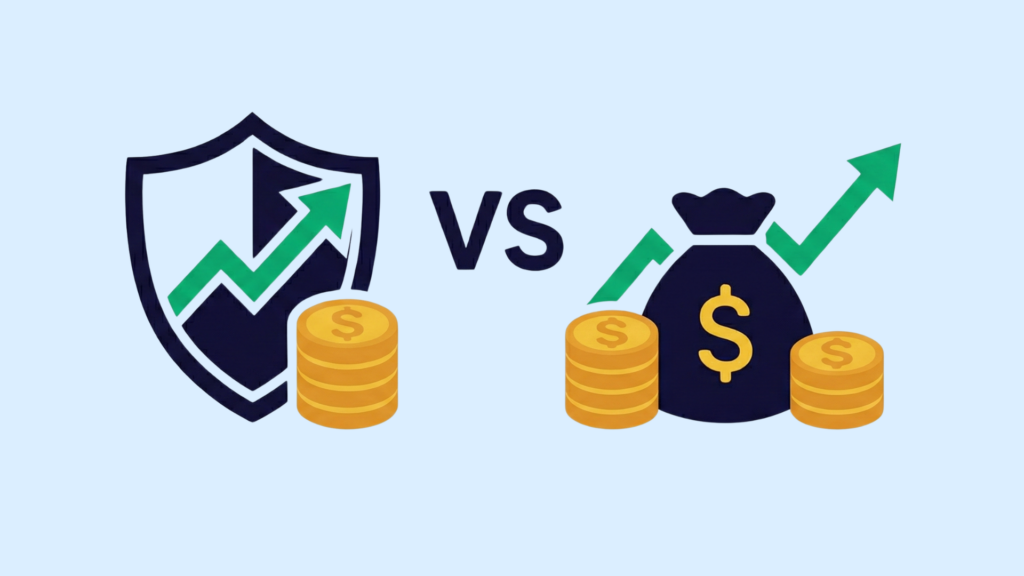Quick Summary:
– The income funds target generating regular income in the form of investment in debt instruments and dividend stocks.
– There are diverse categories of income funds, such as fixed-income, growth and income, high-yield, money market, and diversified income funds.
– Risk-averse investors opt for income funds because of their low risk and capital preservation priority.
– These resources all provide advantages such as recurring income, lower volatility, expert management, and tax efficiency prospects.
– The risks are interest rate volatility, credit risk, and inflation, which may influence the returns and stability of the fund.
What Are Income Funds?
Income funds are a type of mutual fund that focuses on generating steady income rather than maximizing capital growth. These funds predominantly invest in debt instruments (e.g., government securities, corporate bonds, and money market instruments) and dividend-paying stocks, making them suitable for those seeking regular payouts with moderate risk.
Types of Income Funds
Based on your financial goals, you can choose from different types of income funds, such as:
Fixed-Income Funds
Fixed-income funds primarily invest in government bonds and corporate bonds. These funds aim to provide a predictable income stream, making them a low-risk option for conservative investors. The stability comes from investing in high-quality bonds that regularly pay interest.
Growth and Income Mutual Funds
Growth mutual funds and income mutual funds combine growth-oriented assets (like stocks that may increase in value) with income-generating investments (like dividend-paying stocks or bonds). This offers balanced returns, blending capital appreciation with a steady income.
High-Yield Income Funds
High-yield income funds invest in corporate bonds with lower credit ratings (sometimes called junk bonds). While these bonds carry higher risk, they offer better yields, appealing to investors willing to accept more risk for potentially higher income.
Money Market Income Funds
Money market income funds invest in short-term and highly liquid instruments like Treasury bills, certificates of deposit (CDs), and commercial papers. These funds focus on preserving capital while providing modest returns.
Diversified Income Funds
Diversified income funds invest across multiple asset classes, including stocks, bonds, and cash equivalents. This diversification helps balance risk and offers an opportunity to maximise returns.
Key Features of Income Funds
Income funds are a prevalent choice for investors seeking regular income and stable returns. So, let’s discuss some key features that drive this popularity:
Regular Income Distribution
Income funds are designed to provide consistent payouts, typically monthly, quarterly, or annually. These payments come from interest earned on bonds or dividends from stocks within the fund’s portfolio. This feature makes income funds an attractive option for individuals seeking predictable cash flow to manage their financial needs.
Moderate Risk Profile
Income funds focus on investments in relatively stable securities, such as government bonds or corporate debt. These assets are less volatile compared to stocks, making income funds suitable for investors with a lower tolerance for risk. While they are not completely risk-free, they balance potential returns with a conservative approach to risk.
Capital Preservation
A key feature of income funds is their focus on protecting the initial investment (principal) while generating consistent returns. By prioritising lower-risk securities, these funds aim to safeguard your capital, making them a reliable choice for those who value financial security over high returns.
Diversified Portfolio
Income funds spread investments across various asset classes, including bonds, dividend-paying stocks, and short-term instruments. This diversification decreases the impact of poor performance from any single asset, creating a more stable investment experience and helping to optimise returns across different market conditions.
How Do Income Funds Work?
Income funds are designed to generate income through investments in interest-bearing securities and dividend-paying stocks. Here’s how these funds work:
Investment in Debt and Dividend-Paying Instruments
Income funds work by allocating their assets to a mix of debt securities, such as government and corporate bonds and dividend-paying stocks. Fund managers carefully select these instruments to generate consistent returns while maintaining a balanced risk profile. Usually, bonds provide interest income, while stocks contribute dividends, creating a steady stream of earnings for the fund.
Income Distribution to Investors
The income generated from interest and dividends is distributed to investors at regular intervals, such as monthly, quarterly, or annually. These payouts offer a reliable source of cash flow, making income funds particularly appealing for those seeking consistent returns to support their financial goals or daily expenses.
Reinvestment Option
Investors have the flexibility to reinvest the distributed income back into the fund, allowing them to compound their returns over time. This option is ideal for individuals who aim to grow their investment rather than receive immediate payouts, as it leverages the power of compounding to enhance the fund’s value.
Benefits of Investing in Income Funds
Income funds offer a variety of benefits, making them a great addition to an investment portfolio. Some of the primary benefits of investing in Mutual Funds are:
Steady Income Stream
Income funds are an excellent option for individuals looking for predictable cash flow. They provide regular payouts, making them especially suitable for retirees or anyone relying on consistent income to meet financial needs. The distributions typically come from interest on debt securities or dividends from dividend-paying stocks.
Lower Volatility
Compared to equity mutual funds, income funds are less affected by market fluctuations. They primarily invest in debt instruments and other stable securities, providing a relatively safer investment option while still generating consistent returns.
Professional Management
Income funds are managed by experienced professionals who analyse market conditions and allocate assets to meet the fund’s objectives. This expert management ensures optimal selection of securities, helping you maximise returns while keeping risk in check.
Tax Efficiency
Depending on the holding period and the type of income fund, you may benefit from tax efficiency. For example, long-term capital gains on debt funds held for more than three years are taxed after considering indexation (adjusting for inflation). This can make income funds more tax-friendly than fixed deposits for investors in higher tax brackets.
Potential Risks of Income Funds
While income funds offer numerous advantages, they also come with risks that can impact the returns and stability of your investment. These include:
Interest Rate Risk
Income funds, particularly those investing in bonds and fixed-income securities, are exposed to changes in interest rates. When interest rates increase, bond prices generally fall, which can lower the value of the fund’s holdings and, consequently, its returns.
Credit Risk
Funds that invest in corporate bonds or lower-rated securities may face credit risk, which is the possibility of the issuer failing to meet its repayment obligations. It can lead to losses for the fund and affect your returns.
Inflation Risk
Income funds, particularly those with fixed returns, may not always keep up with inflation. If the fund’s returns are lower than the inflation rate, the purchasing power of your investment’s earnings diminishes over time, leading to reduced real returns.
Taxation of Income Funds
The tax treatment of an income fund varies based on the type of fund and the holding period, so it’s important to be aware of these nuances.
Tax on Equity-Oriented Income Funds
For equity-oriented income funds, long-term capital gains (LTCG) are taxed at 10% on gains above ₹1 lakh if the investment is held for more than one year. Short-term capital gains (STCG) are taxed at a flat rate of 15% if the investment is sold within one year.
Tax on Debt-Oriented Income Funds
Debt-oriented income funds follow a different tax structure. If held for more than three years, LTCG is taxed at 20%, with the advantage of indexation (adjusting the purchase price for inflation). However, if the fund is sold three years from the time of investment, short-term capital gains are taxed depending on the investor’s income tax slab.
Who Should Invest in Income Funds?
While income funds can benefit a wide range of investors, certain profiles stand to gain more from these funds due to their steady income generation and lower risk exposure. Here’s a breakdown of the ideal investor types for income funds:
Retirees and Conservative Investors
Income funds offer relatively lower risk compared to equity-based investments, making them ideal for individuals who want to preserve their capital while receiving consistent payouts from dividends or interest.
Investors with Medium-Term Goals
Income funds are also appropriate for investors with medium-term financial goals, typically within a 3 to 5-year horizon. Whether it’s saving for a child’s education or a planned large purchase, income funds offer a stable return over this period, making them an attractive option for goal-oriented investors.
Risk-Averse Investors
Income funds offer a less volatile alternative to equities for risk-averse investors who prefer to avoid the market’s volatility. These investors are often more focused on preserving their capital than chasing high returns, making income funds a comfortable fit.
The Bottom Line
Income funds provide steady income with moderate risk, making them ideal options for investors seeking reliable returns and portfolio diversification. They offer a balanced approach by combining debt and dividend-paying securities, which helps mitigate risk while delivering consistent payouts.
Before investing, it’s essential to evaluate your financial goals and risk tolerance. Appreciate is the best trading app that can guide you in selecting the best income funds that align with your needs and investment objectives.
Download the Appreciate trading app now!
Also Read: How to Read Stock Market Charts | Dollar Cost Averaging
FAQs
How do income mutual funds generate returns?
Income mutual funds generate returns primarily through interest income from bonds and dividends from stocks. They may also earn returns from capital gains if the value of their securities appreciates over time.
What are the best income funds in India?
The best income funds in India typically vary based on risk tolerance and financial goals. Some popular options include funds that focus on debt securities, government bonds, or a combination of bonds and dividend-paying stocks.
How do growth and income mutual funds differ from regular income funds?
Growth mutual funds primarily invest in equities to achieve capital appreciation over time, while income funds focus on generating steady income through interest or dividends. Regular income funds may offer lower risk and more predictable returns compared to growth funds.
Are income funds risk-free?
Income funds are not risk-free, as they involve exposure to interest rate, credit, and inflation risks. However, they generally carry lower risk than equity funds, especially those invested in government bonds or high-quality corporate debt.
How are income funds taxed?
Long-term capital gains (LTCG) from debt funds are taxed at 20% with indexation benefits (if held for over three years), while equity-oriented income funds are taxed at 10% above ₹1 lakh after one year.
Can I lose money in income mutual funds?
While income funds are considered lower risk, there is still a risk of losing money, especially during periods of rising interest rates or defaults by issuers.
What factors should I consider before investing in income funds?
Before investing, consider your risk tolerance, financial goals, and investment horizon. Additionally, evaluate the fund’s asset allocation, historical performance, and the types of securities it holds.
How do income funds handle interest rate fluctuations?
Income funds are sensitive to changes in interest rates; rising rates can decrease the value of bond investments, lowering the fund’s returns.
Are income funds suitable for long-term investment?
Income funds can be suitable for long-term investment, especially if the goal is to generate a steady income stream.
How do I choose between growth and income mutual funds?
Growth funds are ideal if you’re looking for capital appreciation, while income funds are better suited if you seek regular income with relatively lower risk.
What is the minimum investment amount for income mutual funds?
The minimum investment amount for income mutual funds typically starts at ₹500 to ₹1,000 for systematic investment plans (SIPs) or lump-sum investments. This amount can vary based on the fund and the investment platform.
Disclaimer: Investments in securities markets are subject to market risks. Read all the related documents carefully before investing. The securities quoted are exemplary and are not recommendatory.























